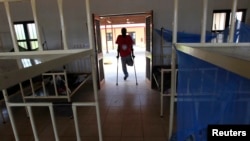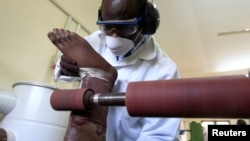South Sudan is grappling with an influx of people living with disabilities as victims of ongoing conflicts in neighboring countries, such as Sudan, come in search of devices like artificial limbs. This surge puts immense pressure on South Sudan, a nation with just three specialized orthopedic centers.
At 9 years old, Ladu Jackson had to learn to walk with elbow crutches after a road accident forced doctors to amputate his left leg.
The incident initially turned Jackson’s life upside down, leaving him unable to engage in his favorite childhood activity, football.
Today, Jackson, now 23 years old, is one of South Sudan’s most recognizable amputee footballers, using the crutches to move while he kicks the ball with his remaining leg.
“In 2021, I started learning how to play football with one limb,” he said. ‘I didn’t know there was something called amputee football. I was just thinking, ‘I wish my leg was not amputated’ because I loved playing football so much.”
Jackson received support at the Physical Rehabilitation Reference Centre in Juba, established in 2009, two years before the country gained independence.
The center, supported by the International Committee of the Red Cross (ICRC), is not only helping South Sudanese like Jackson but also aiding refugees fleeing civil war in Sudan.
“Of course, there are already clients with these conditions, but their numbers keep getting bigger because of conflicts and more road accidents,” said Uwar Bosco, head of the Juba-based prosthetic and orthotic center.
One such client is Adam Ahamed Mohamed, a refugee from Sudan who received his first prosthetic leg at the center. He fled to South Sudan after his entire family was displaced from their home in Sudan’s Darfur region.
Mohamed said he was shot in both legs. One leg was amputated at the Juba Teaching and Referral Hospital before he was taken to the Rehabilitation Reference Center, where he got a prosthetic leg.
The growing influx of refugees has placed immense strain on South Sudan’s fragile health care system, still recovering from its own civil war.
James Ochan, a disability inclusion adviser, said the center is coping with a rising tide of patients.
“So far, the data we’ve registered this year — from January to October — is 2,549,” he said. “We’ve not yet recorded the data for November.”
Ochan attributes the increase to neighboring Sudan's civil war, which has intensified over the past year.
“This year, we’ve seen a lot of influx from the crisis in Sudan. We have a team doing response at all the entry points from Sudan to South Sudan,” he said.
South Sudan ratified the U.N. Convention on the Rights of Persons with Disabilities on Feb. 21, 2023. The convention ensures equal rights for individuals with disabilities and supports societal reintegration for people like Jackson and Mohamed.
Ochan said that beyond providing prosthetics, the center helps individuals rebuild their lives and reintegrate into society.
“After rehabilitation and fitting with devices, they need to go back home or into society to start anew. After such incidents, some may feel they’re no longer part of society,” he said.
The center also promotes sports and economic activities for persons living with disabilities, helping them regain a sense of normalcy.
“We are supporting sporting activities like wheelchair basketball and amputee football,” Ochan said. “This is fully supported by the ICRC. We also have microeconomic initiatives to help persons with disabilities start businesses and become productive citizens.”
South Sudan is in the process of enacting a disability act, which Ochan believes will further cement the rights and freedoms of persons with disabilities.





